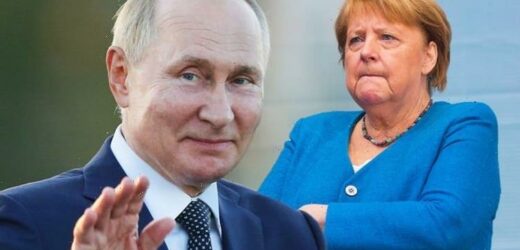Gas prices: Putin ‘going to keep squeezing’ says expert
We use your sign-up to provide content in ways you’ve consented to and to improve our understanding of you. This may include adverts from us and 3rd parties based on our understanding. You can unsubscribe at any time. More info
The Kremlin has already come under fire for striking a deal with Germany over the Nord Stream 2 pipeline, which according to some, undermines Poland’s and Ukraine’s national security. Similar concerns have been raised about Russia’s recent dealings with Hungary as the two nations negotiated a 15-year deal for Budapest to access gas from the TurkStream pipeline in the Black Sea. And with the continent firmly in the grips of an energy crisis, some fear Vladimir Putin may become the de facto energy tzar of Europe.
Dwindling gas supplies and a push for green energy threaten to leave the European Union in a precarious position this winter.
Intermitted power sources like wind and solar may not need the demand for winter heating and lights, leaving Europe to search for energy sources elsewhere.
But gas and coal suppliers have favoured in recent months the Asian market, which has experienced a growing appetite for energy.
In a bid to ease the energy crisis before winter strikes, Europe may have to turn to Mr Putin to satisfy its energy needs though there is no guarantee Russia will have the capacity to meet the sudden increase in demand.


There are also concerns Russia may strategically withhold gas and coal supplies from the EU, to leverage the crisis against the bloc.
According to Natasha Tyrina, principal research analyst at Wood Mackenzie Ltd., Russia might not be able to accommodate a sudden shift to coal just before winter.
She told Bloomberg: “If all the European utilities switch to coal, it will result in a huge spike in coal demand that Russia alone cannot provide for on such a short notice.
“That would need supply from other countries as well, from the US for example, but the situation there is similar to everywhere else.”
And it’s not just Europe that is struggling with energy and gas supplies.
Energy crisis: Craig Mackinlay on usage of 'Putin’s gas'
China, in particular, has been struck by a chaotic crisis that threatens to have an impact on the global economy.
The UK has also taken a hit earlier this month, with nine small energy suppliers going bust due to low supplies and increased demand for gas.
According to Kirill Chuyko, head of research at BCS Global Markets, European energy suppliers are scrambling to secure coal and gas from the East.
But Russia’s interests presently appear to be in Asia.
He said: “Russia has been cutting coal exports to Europe for years as the European Union was closing thermal coal power stations.”


The expert added Russia will struggle to reroute its supplies to Europe “as there are existing contracts with Asian clients” and transportation capacity is limited.
However, it appears as though the EU is yet to make a formal request for resources from the Kremlin.
Russian officials said on Thursday no such request has come through, following a report in Bloomberg that cited two Russian companies saying European suppliers have been asking for more coal.
The Russian Energy Ministry said: “The Russian Energy Ministry has not received any appeals from China and European country on increasing coal exports from Russia.”
Earlier this month experts have warned heating may become something of a “luxury” as a result of the energy crisis.
According to Chris Harvey, a central heating expert at radiator manufacture Stelrad, companies across the UK are bracing for impact.
“I think like many UK manufacturing companies we’re looking at the looming energy crisis with grave concern.
“If we were to face another cold winter, like the previous one that has already left our gas reserves critically low, we could see a return to the days where central heating in family homes is luxury for the rich, rather than the modern convenience many of us have come to expect.
“This will be a worrying time for many of our customers, who with consumer gas prices rising will, perhaps for the first time, think twice before they switch their radiators on this winter.
Source: Read Full Article


